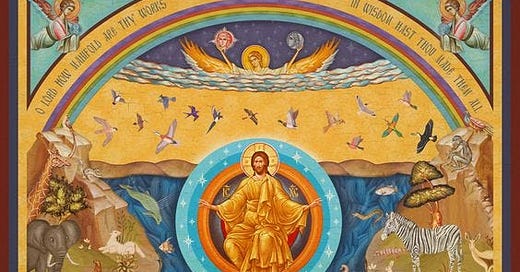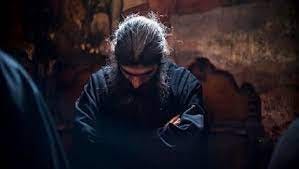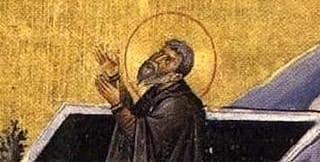"Do not remember your carelessness and your pleasures in the time of your laziness; do not talk about them so that they do not become a stumble".
St. Anthony the Great
Daily Scripture Readings
Hebrews 8:7-13
Brethren, if that first covenant had been faultless, there would have been no occasion for a second. For he finds fault with them when he says: “The days will come, says the Lord, when I will establish a new covenant with the house of Israel and with the house of Judah; not like the covenant that I made with their fathers on the day when I took them by the hand to lead them out of the land of Egypt; for they did not continue in my covenant, and so I paid no heed to them, says the Lord. This is the covenant that I will make with the house of Israel after those days, says the Lord: I will put my laws into their minds, and write them on their hearts, and I will be their God, and they shall be my people. And they shall not teach everyone his fellow or everyone his brother, saying, ‘Know the Lord,’ for all shall know me, from the least of them to the greatest. For I will be merciful toward their iniquities, and I will remember their sins no more.” In speaking of a new covenant he treats the first as obsolete. And what is becoming obsolete and growing Old is ready to vanish away.
Mark 8:11-21
At that time, the Pharisees came and began to argue with him, seeking from him a sign from heaven, to test him. And he sighed deeply in his spirit, and said, “Why does this generation seek a sign? Truly, I say to you, no sign shall be given to this generation.” And he left them, and getting into the boat again he departed to the other side. Now they had forgotten to bring bread; and they had only one loaf with them in the boat. And he cautioned them, saying, “Take heed, beware of the leaven of the Pharisees and the leaven of Herod.” And they discussed it with one another, saying, “We have no bread.” And being aware of it, Jesus said to them, “Why do you discuss the fact that you have no bread? Do you not yet perceive or understand? Are your hearts hardened? Having eyes do you not see, and having ears do you not hear? And do you not remember? When I broke the five loaves for the five thousand, how many baskets full of broken pieces did you take up?” They said to him, “Twelve.” “And the seven for the four thousand, how many baskets full of broken pieces did you take up?” And they said to him, “Seven.” And he said to them, “Do you not yet understand?”
Saint James, Bishop of Nisibis
Saint James, Bishop of Nisibis, was the son of prince Gefal (Armenia) and received a fine upbringing. From the time of his youth he loved solitude, and for a long time he lived in the mountains around about the city of Niziba (on the border of the Persian and Roman Empires), where he carried out strict ascetic exploits: he lived under the open sky, fed himself with tree fruits and greens, and dressed himself in goat-skins. The monk passed all this time in prayerful conversations with God.
During a persecution by the emperor Maximian (284-305) he was glorified by a courageous confession of faith. Because of his strict and pious life the inhabitants of Nisibis chose him as their bishop (no later than the year 314). Saint James was glorified by his ardent zeal for the Orthodox Faith, by great miracles and by the gift of clairvoyance. By his prayers Nisibis was saved from an invasion by Sapor, the emperor of Persia.
Saint James, among the Fathers of the First Ecumenical Council, was one of the prominent defenders of the Orthodox Faith. A wise and educated pastor, he constructed a public school at Nisibis, in which he himself was an instructor. He made a strong impression on the hearts of his listeners by the high morality of his life.
Saint Gregory, bishop of great Armenia, turned to him with a request to write about the faith, and the Nisibis pastor sent to him by way of reply a detailed Discourse (18 Chapters): about the faith, about love, fasting, prayer, spiritual warfare, the resurrection of the dead, the duties of pastors, about circumcision (against the Jews), about the choice of foods, about Christ as the Son of God, and so on. His composition distinguishes itself by its persuasive clear exposition and warmth.
Saint James died peacefully in about the year 350.
Spiritual Wisdom from St. Nectarios of Aegina
Discovering God
It is evident that unbelief is an evil offspring of an evil heart; for the guileless and pure heart everywhere discovers God, everywhere discerns Him, and always unhesitatingly believes in His existence. When the man of pure heart looks at the World of Nature, that is, at the sky, the earth, and the sea and at all things in them, and observes the systems constituting them, the infinite multitude of stars of heaven, the innumerable multitudes of birds and quadrupeds and every kind of animal of the earth, the variety of plants on it, the abundance of fish in the sea, he is immediately amazed and exclaims with the Prophet David: "How great are Thy works, O Lord! In wisdom Thou made them all." Such a man, impelled by his pure heart, discovers God also in the World of Grace of the Church, from which the evil man is far removed. The man of pure heart believes in the Church, admires her spiritual system, discovers God in the Mysteria, in the heights of the theology, in the light of the Divine revelations, in the truths of the teachings, in the commandments of the Law, in the achievements of the Saints, in the very good deed, in every perfect gift, and in general in the whole of the creation. Justly then did the Lord say in His Beatitudes of those possessing purity of the heart: "Blessed are the pure in heart, for they shall see God."
This week’s calendar reminders:
Monday 1/14: Matins 8:30 am
Tuesday 1/15: no services or events
Wednesday 1/16: no services or events
Thursday 1/17: Matins 8:30 am
Friday 1/18: Matins 8:30 am
Saturday 1/19: Choir Practice 5 pm; Great Vespers 6 pm
Sunday 1/20: Divine Liturgy 9:15am











